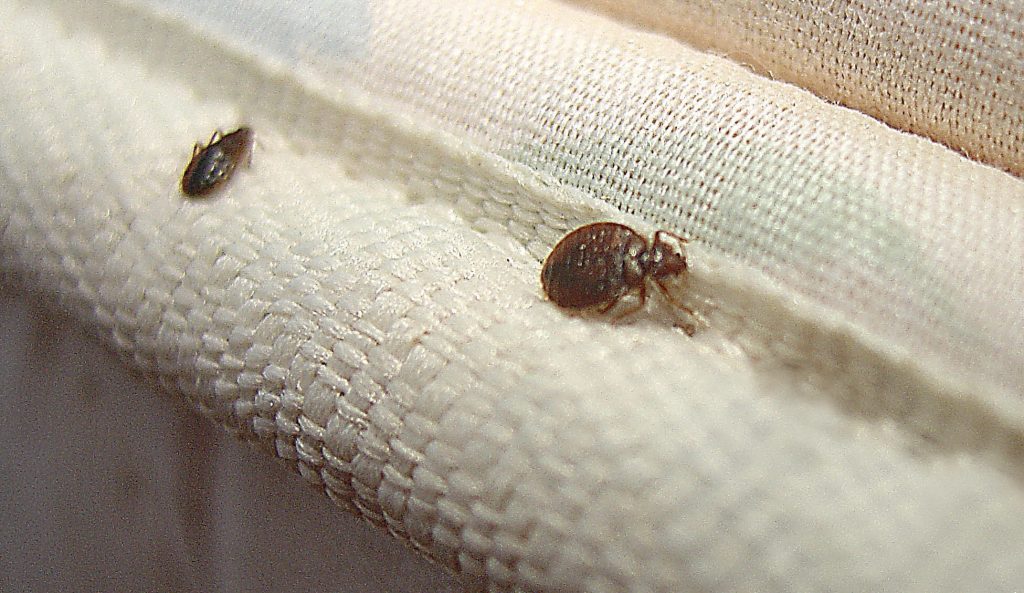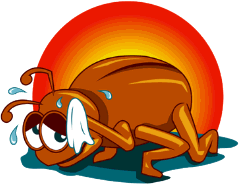There’s so much information about bed bugs out there, that it can be overwhelming. So I thought I would put together a list of frequently asked questions to make learning about them a little easier for you. Here’s everything you need to know about bed bugs.
What do bed bugs look like?
Adult bed bugs are brown and can get up to a quarter of an inch in diameter. They look similar to a flat apple seed. Younger life stages can appear yellowish or translucent with a squiggly dark pattern on its abdomen. Eggs are almost clear and difficult to see with untrained eyes.
How did I get bed bugs?
Did you recently…
- Have anyone stay at your home?
- Stay in a hotel, rental home or cabin?
- Travel out of state or out of the country?
- Buy or rent second hand furniture?
- Bring home something from a garage sale?
- Host a party where guests put purses and coats on your bed?
- Use public transportation, taxi cabs, buses, etc.?
- Move into an apartment? Did the landlord mention previous issues?
These are all common ways to get bed bugs. They hitchhike on items like purses, luggage, briefcases, can hide in cracks and crevices of furniture, etc. They go where they know they’ll get a blood meal.

Can bed bugs make you sick?
Having bed bugs can be incredibly stressful. These bugs invade the most private place in your house…your bed. Having an infestation where you’re getting bitten frequently can also pose a health risk. Bites can become infected through scratching. Besides that though, they’re not poisonous, they aren’t known for carrying diseases, and are mostly a nuisance.
Do bed bugs only live in beds?
Bed bugs are mainly noticed in beds, but they can and do live in various other items, such as nightstands, picture frames, curtains or tags on blankets, in electrical outlets, etc. They typically hide out within about 15-20 feet of their meal source. They venture out at night to the bed to feed, then spend the rest of their time mating in cracks and crevices of these items. Since they’re flat, it’s easy for them to slip in and out of the tiniest spaces.
How do I get rid of bed bugs?
If you’re wondering how to get rid of bed bugs yourself, I’m sorry to break it to you, but bed bugs are not a DIY pest. Sure, you’ll see products in home improvement stores that claim to say they’ll kill bed bugs. Sure, they might work if you spray a bug directly, but you’re only really killing 1% of the total population of the pest problem you actually have.
Bed bugs breed rapidly. When they’re not feeding on you, they’re laying eggs. Where you see one, there are probably a dozen more within a close radius. And without the proper tools and education, you will not be successful treating on your own.
The sooner you get a professional to help, the better your chances of eliminating them will be.
What’s the best way to get rid of bed bugs?
There are many methods being practiced by pest control companies. Some solely use professional bed bug control products, some have bed bug heat treatment equipment, there are some that use the cryogenically freezing option and some companies have trained bed bug sniffing dogs to point out activity. I’m sure there’s a time and a place for each method.
However many experts agree that heat treatments are the way to go. It ensures that all bed bugs in your home are killed and no stragglers are left behind. Chemical treatments can pose a health risk and are not that effective anymore, due to the resistance some of the bed bugs develop. Freezing options are typically extremely expensive and bed bug sniffing dogs are not an option to everyone because of allergies.
Why is it so hard to get rid of bed bugs?
Bed bugs can live for several months without eating. They are very hardy creatures that withstand a huge range of temperatures and climates. They can survive from nearly freezing all the way to 122 degrees Fahrenheit. That and the fact that they breed constantly makes it tricky to get control of them. The jobs require very scrutinizing attention to detail to identify all potential hiding/breeding zones. Heat treatments exceed the bed bugs livable temperatures for an extended period of time to ensure all bed bugs are killed
Hopefully this compiled list answers all your burning questions about bed bugs. Always remember that if you think you have a case of bed bugs, contact a professional. It’s always better to be safe than sorry.


